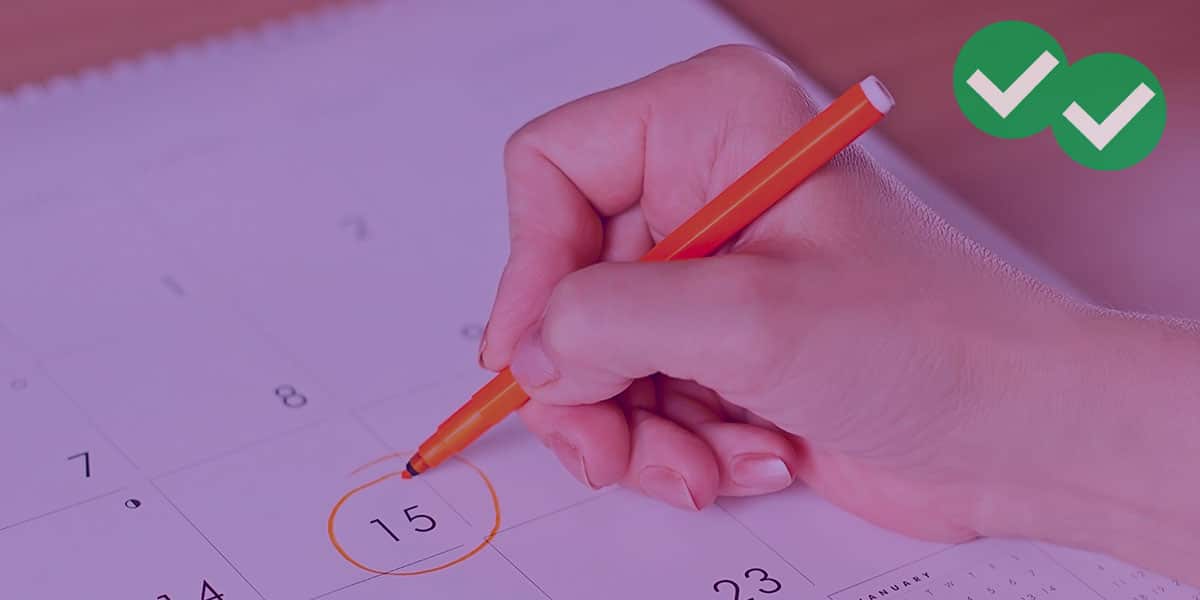
It’s the week before your MCAT! Whether you’ve been prepping for months or feel like you’ve barely skimmed the surface and seriously need to cram, you probably have a lot of feelings about the upcoming exam. So, how does one study for the MCAT in seven days? Even though we recommend postponing the MCAT if you can’t devote more time (at least 8 weeks) to prepare, there are students who get the MCAT scores they need with minimal studying.
You absolutely can increase your MCAT score 1 week if you approach your prep strategically. Knowing how to take the test is almost as important as knowing the information that’s on it. That’s why you should focus your efforts on practicing how to take the exam once you’re down to the wire. We’ve laid out crucial last-minute tips to improve your score between now and test day!
The advice below is divided into three sections. Guidelines for self-care is the first. Next, we give advice to students who haven’t studied much and are seriously cramming. Below that, you’ll see guidelines for students who have studied adequately and just need to optimize their final week.
Increase Your MCAT Score in 1 Week
As you work to improve your MCAT score during this monumental week, think about your mental and physical well-being like the gas (or electricity!) in your car. You can have clean motor oil, new transmission and brake fluids, and perfectly buffered engine coolant—but unless you have enough gas, you can’t travel far.
So, among all the possible last-minute MCAT tips to follow, take this one to heart: look after yourself. This will mean engaging in self-care, whether you’re cramming for the MCAT or revving up your prep after a long study period.
Here are some things to keep in mind:
- Get enough sleep. While this looming exam is inherently stressful, giving yourself 7-9 hours of rest most nights (we know many of you work night shifts and can’t do this every day) will help you approach the test with a clear and rested mind.
- Practice mindfulness. Using apps or even just sitting in a quiet room and noticing what’s going on in your mind—without judgment—is important training for your brain. This way, on test day, you’ll be able to guide yourself calmly back to each question as distractions arise.
- Study during the time of day that matches your test slot. Have a morning exam? If it’s feasible with your work schedule, study in the mornings. While this may not feel important, it’s actually key when it comes to increasing your MCAT score in 1 week. It’s all about forming neurological pathways: your brain will get used to focusing on the material during this time of day.
- Practice under test-like conditions. Work in a quiet room where you won’t be disturbed. Don’t let yourself access anything (from the Internet to your phone) that you won’t have access to on test day. Time yourself and stick to the schedule. Take breaks that align with the structure of the MCAT.
- Eat well. When we’re under pressure, it’s easy to turn to comfort foods. However, the most authentically comforting thing you can do for yourself is to eat a healthy diet with a mixture of proteins, fats, and high-fiber carbohydrates. Give your mind the best possible fuel!
- Plan your test day in advance, down to the route you’ll take to the test center. You can map this out, or even test how long it’ll take you to get there by doing a practice run. There are some things you won’t be able to control about the testing experience—the exact questions you’ll see, for one!—but planning is an aspect you can control.
How to Study for the MCAT in 1 Week (for crammers)
You already know the next several days will be intense—but keep your eyes on the prize! Here are the resources you’ll need to maximize your gains.
Materials for Last-Minute MCAT Review
- Two MCAT practice tests
- AAMC question banks
- (OPTIONAL) Magoosh’s must-watch MCAT lessons
- Timer
What to Do the Week Before the MCAT
Okay, gear up! Now is your chance to dig in.
Day 1
Take a full-length practice exam. Score the exam and go over each question you missed, beginning with questions from your weakest section. Reflect on why you chose each answer—did you know the material? Were you guessing? What was your thought process? Then, review the concepts that are unclear to you.
Day 2
Use the AAMC question banks to practice for the section of the exam on which you scored the lowest.
Divide your day so that you spend 25% of your study time answering practice questions and 75% of the time reviewing your answers. For example, if you have 8 hours set aside to study, spend 2 hours (no more than 3) answering questions under timed conditions and 6 hours reviewing each answer. If you come across a question you missed because you didn’t know the concept, then stop and review it.
Day 3
Move on to the section of the exam where you scored the second lowest. Repeat the method from Day 2 to review these materials.
Day 4
Move on to the section of the exam where you scored the second highest. Repeat the method from Day 2 to review these materials.
Day 5
Move on to the section of the exam where you scored the highest. Repeat the method from Day 2 to review these materials.
Day 6
Take a second full-length practice exam. Then, review your answers.
Day 7
Spend no more than six hours on MCAT prep. Use this limited time to review a few nagging concepts you’re rusty on, or review practice questions. Once your six hours are up, do no more MCAT-related work for the rest of the day. Take this time to relax and be sure to get a good night’s rest.
Not sure how to relieve the MCAT jitters? Check out our video on how to manage pre-med anxiety with mindfulness.
How to Study the Week Before the MCAT (for consolidators)
If you’ve already been following an MCAT study plan, your week will look slightly different. But there are still last-minute MCAT tips you can use as you work out how to improve MCAT scores in 1 week. Here’s how to study for MCAT in 1 week—if you’ve already been studying!
- Take (and review) a final practice test early in the week. You can use this to help you choose how to prep the week before the MCAT in terms of what sections and question types still need your attention.
- Keep following your study plan—but make sure that you give yourself the day before the MCAT off! It’s okay to review a tiny stack of flashcards or 1-2 pages of notes you’ve compiled, but that’s it! Don’t attempt to learn anything new. Rest and relaxation will be far more beneficial for the exam than attempting to stick ten more facts into your already-strained memory.
- If you haven’t been using a study plan, focus this week on dividing your time 50/50. Half of the time, brush up on your weaknesses: these could be content areas or entire sections that you are rusty on or struggle with. The other half of the time, brush up on your strengths. While it may seem like a waste of time to review things you’re already good at, this is important for two reasons. First, it ensures this material is fresh in your mind, so that it remains your strength. Secondly, it builds your confidence. There are parts of this test you’re already really good at—embrace them!
Last-Minute MCAT Tips
If you want to increase your MCAT score in 1 week (which you obviously do, or you wouldn’t have read this far already!), you’ll need to use all of your time strategically! Here’s how to wrap up your week on a high note.
The Day Before the Test
To reiterate advice in this post, if you’re going into the MCAT with very minimal prep, don’t study for more than six hours. If you’ve been studying for a while now, take the day off (you may review a tiny stack of flashcards or up to two pages of written notes). Spend the rest of the time engaging in something fun—physical activity is a good choice, as it’ll help you process excess adrenaline (epinephrine) and cortisol. Or, you might choose something soothing like a movie or catching up with a supportive friend. No matter what, the goal here is to relax and feel good!
Eat balanced meals, drink lots of water, and try to allow for 7-9 hours for sleep. If you have to wake up super early the next day, accept that you might not be able to fall asleep early enough to get in those 7 hours. That’s okay. If you’ve been following the advice here and sleeping plenty throughout the week, you should function fine on test day.
Absolutely prepare yourself for the next day. Remember that you have to arrive at the test center 30 minutes before the exam, so take this into consideration when planning your day. Make sure you have your transportation and route mapped out, if needed. Also, identify a backup option (friend, Uber, Lyft) if your primary transportation malfunctions. Compile everything you need for test day (such as snacks and a valid ID) and lay out your clothing. One fewer choice on test day is a good thing!
Day of the Test
Wake up with plenty of time to spare and eat breakfast or, if it’s too early in the morning, try a snack with protein and carbohydrate (maybe a pre-made protein shake). If you regularly exercise in the morning and have enough time before your exam, today’s not the day to skip that! Exercise can help energize you and minimize stress, so if you can get up early enough without compromising your sleep, this is a good choice.
Arrive at the test center 30 minutes before the exam!
Testing Center Procedures
You know there are things you can bring inside the testing room (precious little!) and then there are things you can bring to the center but only use on breaks. With that in mind:
- Remember your valid ID. Other than the note board and marker, storage key, and earplugs (all of which the center will provide you), your ID is the only thing you can take into the testing room.
- Water, gum, and mints are not allowed in the testing room. Also, you may not wear watches, hats, or jewelry (engagement and wedding rings are usually allowed, but it’s best not to risk it). If your head coverings or jewelry are officially confirmed religious items, you may wear them.
- Plan your breaks ahead of time. Each and every time you reenter the testing room, you must be scanned, show your ID, and sign your name. This can knock off two minutes from your already-short break.
- Carefully consider whether or not to bring a cell phone on test day. You may need it for GPS, but you might also decide to leave it in your glove compartment after getting to the center. Touching a cell phone during the breaks alone means you’ve violated MCAT policies, so it’s better not to risk it.
- You can take prescribed medications during breaks, but you’ll need to take them out of your bag and put them with the food and water you’re storing in the test center facility, so plan this ahead of time.
- Bring something to eat and drink during breaks. These are optional (and some may be eliminated, depending on if you’re taking the shorter 2020 MCAT), but you’ll want to make the most of breaks by getting some fuel and hydration. Keep in mind that the brain is dependent on glucose; it uses most of the body’s entire supply! Do not cut carbohydrates unless you are fully accustomed to eating that way.
- Leave notes and study materials at home or in your car; you can’t access them during breaks.
Takeaways: Increase MCAT Score in 1 Week
So, are you feeling more assured that it is possible to study for the MCAT in 1 week? We hope these last-minute MCAT tips will help boost your confidence and score. Regardless of the time constraints, be sure to be good to your body and engage in plenty of positive self-talk. You want to cultivate an attitude that blends firm discipline with acceptance of your time constraints. That’s truly the key to prepping for the MCAT in 1 week!






